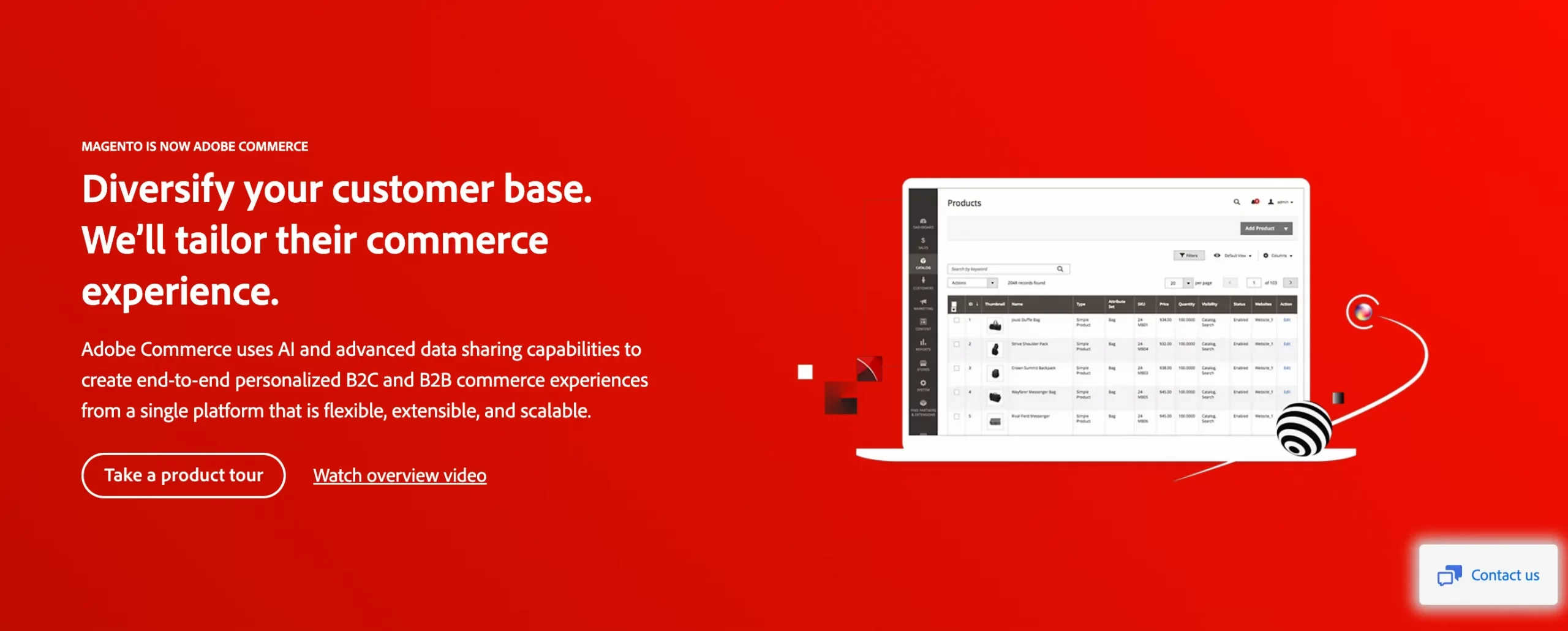Without doubt, Shopify is currently one of the most prominent eCommerce solutions on the market. However, it’s not the only player in the game. While this platform has been a default choice for many businesses, it’s always a good idea to explore other options. So, whether you’re just starting to sell online or looking to switch to a new platform, you might want to take a look at these Shopify competitors down below.
In this article, LitExtension – #1 Shopping Cart Migration Expert will explore some of the top Shopify rivals and how they compare in terms of features, pricing, and other important factors. Here are the key shopify competitors that we’ll take a look at:
Read on and find out which platform will be the best fit for your business!
Shopify Overview
What is Shopify?
Founded in 2006, Shopify has emerged as one of the most popular platforms for online businesses. It offers a user-friendly interface and powerful features that make it simple for businesses of all sizes to create an online store. Even without much technical knowledge, merchants can easily get their store up and running thanks to Shopify’s straightforward interface and simple setup process.

Shopify comes with a range of customizable themes and powerful features, designed to help businesses grow and scale. These include robust analytics tools, marketing features, and support for multiple payment gateways. The platform also offers a wide selection of apps on the Shopify app stores. Together with other integrations, they will allow businesses to streamline their operations easier than ever.
In case you need a reason to keep using Shopify, here are all the powerful features it offers to help you grow your business:
With more than 4 million businesses worldwide using their solution, Shopify has certainly earned a worthy reputation in the world of eCommerce.
Reasons to consider a Shopify alternative
There are several factors to why online sellers may want to have a list of Shopify biggest competitors.
One of the major reasons to compare Shopify and competitors is the cost of operating a Shopify store. While Shopify pricing plans are diverse and can cater to different needs, they may not be the most affordable options for everyone. Depending on the specific needs of your online store, you may be able to find a more cost-effìcient solution that offers similar features and functionality.

Another aspect to consider is the level of customization. While Shopify does give users plenty of customizable themes to choose from, some online sellers may require more flexibility in terms of design and branding. In this case, a competitor to Shopify with more extensive customizing options might be more suitable.
In addition, merchants may require special eCommerce features that are not directly available on Shopify. While the Shopify app store has a wide range of third-party apps and plugins, there may be a few functionalities that a hosted-cart may not be able to offer.
For the reasons above, it is important to look at all your options when choosing an eCommerce platform and take a few Shopify alternatives into consideration.
5 Most Popular Shopify Competitors
So who are Shopify competitors? Without further ado, let’s dive into these Shopify competitor analysis with LitExtension!
1. Wix
Wix, a popular website builder, is emerging as one of the strongest Shopify competitors in the eCommerce space.

The most significant advantage Wix has in the battle of Wix vs Shopify is its pricing. Wix offers a variety of pricing tiers, including a free plan, which can be appealing for those just starting with their online store. Its premium plans are also affordable, making it a more budget-friendly option for many online sellers.
This platform also has a built-in blog, great email marketing capabilities, and seamless social media integrations. In terms of design, Wix allows users to create professional-looking websites with ease. It offers a drag-and-drop website builder, over 500 templates, and extensive customization options. While Shopify only has 10+ free themes, you can get access to all Wix website templates at no extra cost.
💡 Check out this article to help you get a full view on Wix: Wix Review – Why this Platform Can Be an Amazing Choice for Your Business.
The Verdict:
If you’re looking for a more affordable option than Shopify which offers a good range of features and customization options, Wix may be the right choice for you.
2. BigCommerce
When talking about Shopify top competitors, it’s hard not to mention BigCommerce. Like Shopify, BigCommerce is a hosted platform that can let you create an online store quickly. But what sets this eCommerce solution apart?
💡 You may want to read: BigCommerce Review – All You Need to Know about this eCommerce Solution
First, let’s talk about features. BigCommerce is known for its robust features that help run your online store become more efficient. For example, BigCommerce allows merchants to create up to 600 product variants per product, while Shopify limits this to only 100 per product. This is especially advantageous for businesses with complex product options, such as clothing or customizable products.

Apart from BigCommerce themes that are highly customizable, the platform allows for a more customizable checkout process, including the ability to add custom fields or edit the checkout form. This can be important for businesses with specific checkout requirements or branding needs.
When comparing BigCommerce vs Shopify on the ability to expand audience reach, BigCommerce not only has a wide range of integrations with marketplaces but also allows users to create multiple storefronts. This unique feature makes it easier for merchants to expand their reach and sell in multiple regions simultaneously. These storefronts can be customized to match with specific customer groups in mind, while keeping store management simple by using a single BigCommerce dashboard.
As for BigCommerce pricing, this platform also provides users with a diverse range of plans to choose from. However, unlike Shopify, BigCommerce doesn’t charge transaction fees on top of your regular monthly subscription. This means you’ll be able to keep more of your profits with BigCommerce.
The Veridct:
Overall, BigCommerce offers several advantages in terms of features and selling flexibility compared to Shopify, making it one of the most formidable competitors of Shopify.
Need Help To Migrate Your Store?
If you are intending to migrate from Shopify to BigCommerce, LitExtension offers a great migration service that helps you transfer your data from the current eCommerce platform to a new one accurately, painlessly with utmost security.
3. WooCommerce
The next on our list of Shopify competitors is WooCommerce, a popular open-source eCommerce platform.

One of the biggest advantages of WooCommerce vs Shopify is its open-source nature, which means that developers have complete control over the source code. Store owners can create unique online stores to meet the needs of individual businesses, with a variety of templates and themes to choose from.
💡 Take a closer look at WooCommerce with this comprehensive WooCommerce Review.
WooCommerce pricing is another area where this platform has an edge over Shopify. WooCommerce is free to use – all you have to do is to install the WooCommerce extension to your WordPress site. Though it does require users to pay for their own hosting and domain name, it can be much more cost-effective in the long run, especially for businesses that are just starting out. In contrast, Shopify charges a monthly subscription fee and takes a percentage of every sale made.
Users also get access to a wider range of WooCommerce plug-ins and extensions. There are also more payment gateways compared to Shopify, making it easier for customers to pay for products in their preferred method.
The Verdict:
In short, WooCommerce is one of the best Shopify competitors because it provides users with a lot more control over their online store.
Need Help To Migrate Your Store?
If you are intending to migrate from Shopify to WooCommerce, LitExtension offers a great migration service that helps you transfer your data from the current eCommerce platform to a new one accurately, painlessly with utmost security.
4. Magento
Magento (now Adobe Commerce) is a powerful online selling platform that is designed for large and enterprise-level businesses. Being one of the most outstanding Shopify competitors, Magento can provide users with advanced functionalities and flexible customization options.

A key advantage of Magento vs Shopify is its scalability. Magento can handle large amounts of traffic and sales without sacrificing performance. The platform’s robust features, such as multi-store management, make it a great option for businesses that need to manage multiple stores from one platform.
💡 If you want to know more about what Magento can offer, here is our full Magento review for your consideration.
Another aspect that Magento excels over Shopify is its flexibility. With its open-source nature, developers can customize and extend the platform to meet their specific needs. This means that businesses can create unique eCommerce experiences that cater to their customers’ needs.
When it comes to Magento pricing, this platform is free to download and use, making it an attractive option for businesses that want to keep their costs down. However, businesses will need to invest in hosting and development costs to get the most out of the platform.
In terms of features, Magento offers a wide range of tools and functionality that can rival Shopify’s. These include powerful SEO optimization, advanced product management, and integrations with popular payment gateways. These features can help businesses improve their online presence and streamline their eCommerce operations.
The Verdict:
To conclude, Magento is an excellent alternative to Shopify for businesses that need a highly customizable and scalable eCommerce platform.
5. Squarespace
As a Shopify alternative, Squarespace offers a comprehensive set of features to help online businesses succeed.

Squarespace takes pride in its stunning templates and intuitive drag-and-drop website builder. With Squarespace, merchants can easily create a visually appealing and engaging online store without needing any design or coding skills. The platform also offers a powerful set of customization tools to help merchants tailor their website to their unique brand identity.
In terms of Squarespace pricing, the platform offers competitive plans that are more suited for small to medium-sized businesses than Shopify. With its lower subscription fee, Squarespace still offers robust eCommerce features including inventory management, shipping and tax calculation.
Need more information about Squarespace? Check out our full Squarespace review! Or read on about how these two platforms compare using this article on Shopify vs Squarespace.
The Verdict:
Squarespace is among top Shopify competitors because it’s a great option for small to medium-sized businesses looking for an all-in-one platform to manage their online presence.
How To Choose The Right Shopify Alternative
When it comes to choosing the right alternative among Shopify competitors, there are several factors to consider.
- Ease of use: You want a platform that is easy to navigate and manage, even if you don’t have a lot of technical experience. Make sure to look for platforms that offer intuitive interfaces and drag-and-drop functionality to make the process as simple as possible.
- Design and customization options: You want your online store to stand out and reflect your brand’s unique style. Look for platforms that offer a wide range of design templates and customization options. This will allow you to create a store that truly represents your brand.
- eCommerce features: Make sure the platform you choose offers the features you need to run your online business successfully. Features such as inventory management, payment processing, shipping and tax calculators, and customer management tools are essential factors to consider. They will help you streamline your operations and improve the overall customer experience.

- Apps and integrations: Platforms that have a wide range of apps and integrations can help you enhance your store’s functionality. This might include apps for email marketing, SEO, analytics, and many others.
- Pricing and scalability: Look for a platform that offers flexible pricing options. By doing so, you can choose a plan that suits your budget and needs. Additionally, a highly scalable platform can help you easily grow your business as your selling needs evolve.
By considering these key factors, you can find the right Shopify alternative that will help you run a successful online business.
Shopify Competitors: FAQs
[sp_easyaccordion id=”54688″]
Final Thoughts
While Shopify is a popular and well-established eCommerce platform, there are several viable Shopify competitors available for businesses of all sizes. Each of these alternatives offers unique features and advantages that may better suit the needs of certain businesses.
By carefully considering essential factors such as pricing and eCommerce features, businesses can make an informed decision about which platform is the best fit for their needs. Ultimately, the right eCommerce platform can help businesses increase sales, build customer loyalty, and achieve long-term growth and success.
If you need more information on eCommerce platforms, make sure to check out the LitExtension blog for helpful tips and tricks. Or join our dynamic eCommerce Community today and get the assistance you need from thousands of store owners worldwide!
